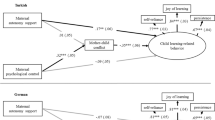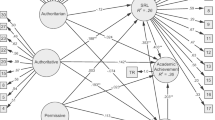Abstract
The role of parental behavioural control in influencing developmental outcomes of children and adolescents has been inconsistently delineated in the literature. The present study aims to examine the relationships among parental behavioural control, academic self-efficacy, anxieties and academic achievement of young Chinese children in Hong Kong, paying particular attention to understanding the role of academic self-efficacy and anxieties in influencing the relationship between parental behavioural control and children’s academic achievement. Two hundred and thirty-five parents of junior elementary school students completed a battery of standardised questionnaires. Results interestingly documented an inconsistent mediation effect for both academic self-efficacy and social anxiety. In essence, parental control indeed had a significant positive influence on academic achievement among Chinese junior primary school students in Hong Kong. Nevertheless, parental behavioural control at the same time decreased academic self-efficacy and induced social anxiety feelings, which in turn led to a lower level of academic achievement. Given that a greater parental behavioural control is inherently culturally accepted in Chinese communities, such findings shed light on that enhancing academic self-efficacy and reducing social anxiety are potential mechanisms through which parents could facilitate growth and development in their children. The results could also lessen the “guilt and blame” that are unnecessarily placed on some Chinese parents.
Similar content being viewed by others
References
Bandura, A. (1990). Multidimensional scales of perceivd self-efficacy. Stanford, CA: Stanford University.
Bandura, A. (1997). Self-efficacy: The exercise of control. New York, NY: W. H. Freeman.
Barber, B. K., Olsen, J. E., & Shagle, S. C. (1994). Associations between parental psychological and behavioral control and youth internalized and externalized behaviors. Child Development, 65(4), 1120–1136.
Bean, R. A., Barber, B. K., & Crane, D. R. (2006). Parental support, behavioral control, and psychological control among African American youth: The relationships to academic grades, delinquency, and depression. Journal of Family Issues, 27(10), 1335–1355.
Boyd, C. P., Gullone, E., Needleman, G. L., & Burt, T. (1997). The Family Environment Scale: Reliability and normative data for an adolescent sample. Family Process, 36(4), 369–373.
Chen-Bouck, L., & Patterson, M. M. (2017). Perceptions of parental control in China: Effects of cultural values, cultural normativeness, and perceived parental acceptance. Journal of Family Issues, 38(9), 1288–1312. https://doi.org/10.1177/0192513x15590687.
Chen, W.-W., & Ho, H.-Z. (2012). The relation between perceived parental involvement and academic achievement: The roles of Taiwanese students’ academic beliefs and filial piety. International Journal of Psychology, 47(4), 315–324.
Chua, A. (2011). Battle hymn of the tiger mother. New York, NY: Penguin.
Evans, R., Thirlwall, K., Cooper, P., & Creswell, C. (2017). Using symptom and interference questionnaires to identify recovery among children with anxiety disorders. Psychological Assessment, 29(7), 835–843.
Galla, B. M., & Wood, J. J. (2012). Emotional self-efficacy moderates anxiety-related impairments in math performance in elementary school-age youth. Personality and Individual Differences, 52(2), 118–122.
Hae-Seong, P., & Scott, B. (2002). Parenting practices, ethnicity, socioeconomic status and academic achievement in adolescents. School Psychology International, 23(4), 386–396.
Huang, J., & Prochner, L. (2003). Chinese parenting styles and children’s self-regulated learning. Journal of Research in Childhood Education, 18(3), 227–238. https://doi.org/10.1080/02568540409595037.
Kline, R. B. (2015). Principles and practice of structural equation modeling (4th). New York: NY: Guilford Publications.
Kramer, K. Z. (2012). Parental behavioural control and academic achievement: Striking the balance between control and involvement. Research in Education, 88(1), 85–98. https://doi.org/10.7227/rie.88.1.8.
Lane, J., & Lane, A. (2001). Self-efficacy and academic performance. Social Behavior and Personality: an International Journal, 29(7), 687–693.
Lee, J., Yu, H., & Choi, S. (2012). The influences of parental acceptance and parental control on school adjustment and academic achievement for South Korean children: The mediation role of self-regulation. Asia Pacific Education Review, 13(2), 227–237.
Leung, K., Lau, S., & Lam, W.-L. (1998). Parenting Styles and Academic Achievement: A Cross-Cultural Study. Merrill-Palmer Quarterly, 44(2), 157–172.
Ma, H. K., & Leung, M. C. (1990). The adaptation of the Family Environment Scale to Chinese children and adolescents in Hong Kong. International Journal of Psychology, 25(2), 545–555.
Masud, H., Thurasamy, R., & Ahmad, M. S. (2015). Parenting styles and academic achievement of young adolescents: A systematic literature review. Quality & quantity, 49(6), 2411–2433.
McLeod, B. D., Wood, J. J., & Weisz, J. R. (2007). Examining the association between parenting and childhood anxiety: A meta-analysis. Clinical Psychology Review, 27(2), 155–172.
Moos, R., & Moos, B. (1981). Manual for the Family Environment Scale. New York: Worth Publishers.
Mousavi, S. E., Low, W. Y., & Hashim, A. H. (2016). Perceived Parenting Styles and Cultural Influences in Adolescent’s Anxiety: A Cross-Cultural Comparison. Journal of Child and family Studies, 25(7), 2102–2110. https://doi.org/10.1007/s10826-016-0393-x.
Phillips, M., Shen, Q., Zheng, Y., Zhao, J., Jiang, S., & Wang, L. (1991). Preliminary evaluation of Chinese version of FACES II and FES: Comparison of normal families and families of schizophrenic patients. Chinese Mental Health Journal, 5, 198–202.
Pinquart, M. (2016). Associations of Parenting Styles and Dimensions with Academic Achievement in Children and Adolescents: A Meta-analysis. Educational Psychology Review, 28(3), 475–493.
Preacher, K. J., & Hayes, A. F. (2008). Asymptotic and resampling strategies for assessing and comparing indirect effects in multiple mediator models. Behavior Research Methods, 40(3), 879–891.
Schlenker, B. R., & Leary, M. R. (1982). Social anxiety and self-presentation: A conceptualization model. Psychological Bulletin, 92(3), 641–669. https://doi.org/10.1037/0033-2909.92.3.641.
Spence, S. H. (1998). A measure of anxiety symptoms among children. Behaviour Research and Therapy, 36(5), 545–566.
Stutz, M., & Schwarz, B. (2014). Effects of different facets of paternal and maternal control behaviour on early adolescents’ perceived academic competence. European Journal of Developmental Psychology, 11(2), 227–241.
Symeou, M., & Georgiou, S. (2017). Externalizing and internalizing behaviours in adolescence, and the importance of parental behavioural and psychological control practices. Journal of Adolescence, 60(Supplement C), 104–113. https://doi.org/10.1016/j.adolescence.2017.07.007.
Turner, E. A., Chandler, M., & Heffer, R. W. (2009). The influence of parenting styles, achievement motivation, and self-efficacy on academic performance in college students. Journal of College Student Development, 50(3), 337–346.
van Ingen, D. J., Freiheit, S. R., Steinfeldt, J. A., Moore, L. L., Wimer, D. J., Knutt, A. D., & Roberts, A. (2015). Helicopter Parenting: The Effect of an Overbearing Caregiving Style on Peer Attachment and Self-Efficacy. Journal of College Counseling, 18(1), 7–20. https://doi.org/10.1002/j.2161-1882.2015.00065.x.
Wang, M., Deng, X., & Du, X. (2017). Harsh parenting and academic achievement in Chinese adolescents: Potential mediating roles of effortful control and classroom engagement. Journal of School Psychology, 67, 16–30.
Wang, Q., Pomerantz, E. M., & Chen, H. (2007). The Role of Parents’ Control in Early Adolescents’ Psychological Functioning: A Longitudinal Investigation in the United States and China. Child Development, 78(5), 1592–1610. https://doi.org/10.1111/j.1467-8624.2007.01085.x.
Wang, W. (2005). Chinese version of the Spence Children’s Anxiety Scale. Retrieved from http://www.scaswebsite.com/docs/scas-parent-chinese.pdf.
Wei, C., & Kendall, P. C. (2014). Child Perceived Parenting Behavior: Childhood Anxiety and Related Symptoms. Child & Family Behavior Therapy, 36(1), 1–18. https://doi.org/10.1080/07317107.2014.878175.
Wong, D. F., Kwok, S. Y., Low, Y. T., Man, K. W., & Ip, P. S. (2018). Evaluating Effectiveness of Cognitive-Behavior Therapy for Hong Kong Adolescents With Anxiety Problems. Research on Social Work Practice, 28(5), 585–594. https://doi.org/10.1177/1049731516658351.
Wong, M. M. (2008). Perceptions of parental involvement and autonomy support: Their relations with self-regulation, academic performance, substance use and resilience among adolescents. North American Journal of Psychology, 10(3), 497–518.
Zhang, W., Wei, X., Ji, L., Chen, L., & Deater-Deckard, K. (2017). Reconsidering Parenting in Chinese Culture: Subtypes, Stability, and Change of Maternal Parenting Style During Early Adolescence. Journal of Youth and Adolescence, 46(5), 1117–1136. https://doi.org/10.1007/s10964-017-0664-x.
Author Contributions
D.F.K.W. designed and executed the study and wrote the paper. X.Y.Z. analyzed the data and collaborated with the writing of the paper. T.K.N. collaborated in the data analysis and offered suggestions in revising the paper.
Funding
The study was funded by Social Welfare Department Fund of Hong Kong.
Author information
Authors and Affiliations
Corresponding author
Ethics declarations
Conflict of Interest
The authors declare that they have no conflict of interest.
Ethical Approval
All procedures performed in studies involving human participants were in accordance with the ethical standards of the institutional and/or national research committee and with the 1964 Helsinki declaration and its later amendments or comparable ethical standards. Ethical approval has been granted by Review Committee of the City University of Hong Kong.
Informed Consent
Informed consent was obtained from all individual participants included in the study.
Rights and permissions
About this article
Cite this article
Wong, D.F.K., Zhuang, X.Y. & Ng, T.K. Is Parental Control Beneficial or Harmful to the Development of Young Children in Hong Kong?. J Child Fam Stud 28, 831–838 (2019). https://doi.org/10.1007/s10826-018-1301-3
Published:
Issue Date:
DOI: https://doi.org/10.1007/s10826-018-1301-3




